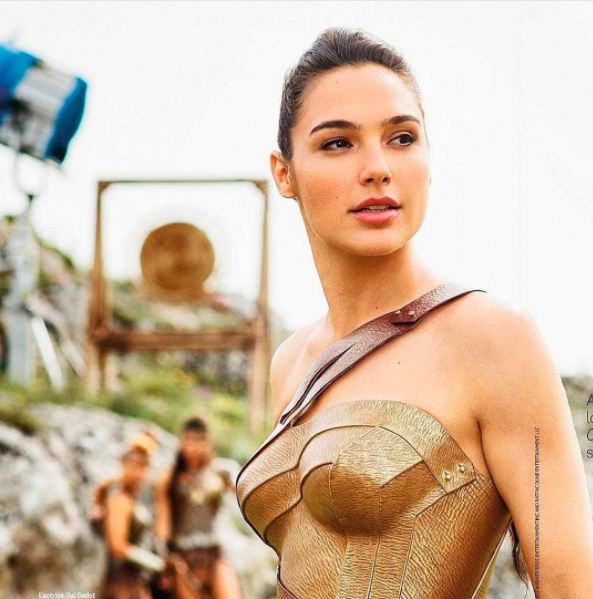
Image: Screen grab via Instagram/@galgadot
“Wonder Woman” has broken many barriers, to say the least. It has been hailed as DC’s best film thus far, smashing box office records and gaining praise from audiences and members of the film industry alike.
Its balance of multidimensional and diverse characters, action, humor and romance made it stand out from past superhero films. That, and that it was led by a powerful, fearless woman in Gal Gadot’s Diana Prince.
But its power comes from its emotional sincerity and femininity, one that director Patty Jenkins wielded into a film worthy of “Wonder Woman”. Find out how the cast and crew under Jenkins’ leadership brought the superhero to life on the big screen after 75 years:
The movie was inspired by the 1978 “Superman”.
“I had been profoundly touched by Superman when I was a kid; it had this special place in my heart,” said Jenkins to Rolling Stone.
“It hit these pockets so perfectly of comedy, action, romance. I wanted to do something that felt as good to go and see and have that adult stuff going on simultaneously,” she added. This lent to the similar positivity in Wonder Woman’s origin story.
It was shot over six months on film.
Jenkins was adamant about using film over digital. “There’s a certain type of epic grander escapism that film gives you that you cannot — you will struggle very hard — to get that on video,” she told Cinema Blend.
They changed Wonder Woman’s timeline from WWII to WWI for an important reason.
Image: Warner Bros.
It was decided that Diana Prince would encounter the world in World War I to contrast with how she was raised in Themiscyra as an “honorable” Amazonian warrior, said producer Charles Roven.
WWI was the first major war with the destruction of guns, gas attacks and other modern warfare. “My approach was to focus on telling the story of mechanized war and how that would look to a god visiting our world for the first time. I wanted the audience to understand the horrors that a war on this scale makes possible and how shocking that would be to someone who comes with a strong sense of honor and justice,” explained Jenkins to Cinema Blend.
Image: Warner Bros.
Women also are not as empowered in that period. “She’s also coming to London where women have won the vote politically but are still not allowed in the hallowed government halls, are not part of the shaping of the government or the shaping of the laws,” added Roven.
The paradise island of Themiscyra was shot in Italy.
The perfect landscape of Themiscyra was set in Marina di Camerota, Ravello and Matera, said producer Rebecca Steel Roven to Cosmopolitan.
The cast and crew stayed at a resort with their families, which helped everyone bond even more. There was one downside to being at the beach: Gadot stepped on an urchin during a fight sequence.
The girl power and sisterhood were real both onscreen and offscreen.
Image: Screen grab via Instagram/@hayleyjanewarnes
“It was like one big celebration of women. The amazing thing about it is that all of us got along really, really, really well. We were all so happy for each other,” said Gadot to the LA Times. Around 120 women were reported to be in the cast.
It was also a family-friendly area. Connie Nielsen, who played Queen Hippolyta, added, “It was the men who were standing up by the park with the kids while we were down on the beach with the horses and the swords.”
Image: Screen grab via Instagram/@hayleyjanewarnes
The Amazonians were also played by real-life athletes, such as champion boxer Anne Wolfe, professional fighter Madeleine Vall Beijner, and CrossFit champion Brooke Ence, to name a few. They trained hard for six months for the stunt choreography which included horseback riding and swordplay—and they did it all together.
“It was like being on a professional football team,” said Robin Wright, who played General Antiope.
There were no deleted scenes, but Jenkins had to fight hard for the most iconic scene.
Image: Warner Bros.
“We didn’t cut one scene in this movie nor did we change the order of one scene in this movie from the script that we went in shooting with,” said Jenkins to Collider. That said, there is no director’s cut, because what Jenkins envisioned is exactly what’s in theaters.
However, she had to fight for one scene: the one in No Man’s Land, where Diana Prince becomes her true warrior self in a wasteland. Some questioned her idea, and she even put the sequences on a storyboard to convince everyone.
“It wasn’t the most obvious scene to some of the people working with me because she’s not fighting anyone, but I knew that scene had to have absolutely everything,” she said to Rolling Stone.
“It’s about her. We’re not angry at the Germans… This is what she needs to do to get across [No Man’s Land], and so it’s about her,” she explained in another interview with Fandango.
Jenkins wanted to reveal a “new kind of hero.”
“I wanted to talk about the fact that we can’t defeat the evils upon us by slaying one villain… we have to lay down the past and become responsible heroes ourselves,” Jenkins told Rolling Stone. “Often what that requires is love and peace instead of battle. That is a hugely important message to the world right now from my perspective.”
As Gadot said in an interview with the Inquirer, “[Patty Jenkins] was chosen not because she was a woman, but because she was the right person for the task.” Niña V. Guno/JB
RELATED STORIES:
LOOK: ‘Wonder Woman’ recruited actual athletes, fighters as powerful Amazonians
LOOK: Lupita Nyong’o’s epic review, celebrity reactions to ‘Wonder Woman’
What you should know about Gal Gadot, and why she’s perfect as ‘Wonder Woman’